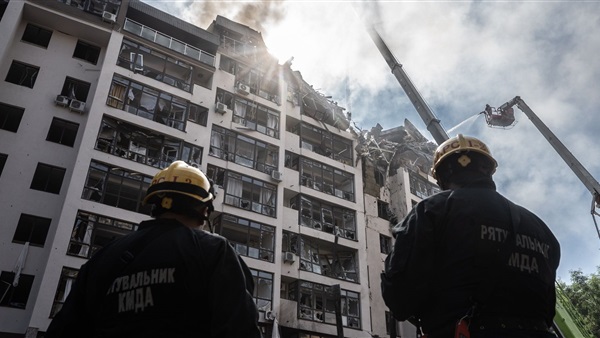First major air strike in Ukraine’s capital city

Russia launched the largest
missile barrage on the Ukrainian capital of Kyiv in weeks early Sunday, hours
before a Group of Seven meeting convened in Germany to discuss new economic
measures to stop Moscow’s invasion.
Several missiles flew toward Kyiv
around dawn, and Ukrainian air defenses shot down at least one on the outskirts
of the capital, Ukrainian government officials said. One missile hit an
eight-story residential building, where city officials said residents were
pulled from the rubble. One person died and four others were injured, including
a 7-year-old girl and her 35-year-old mother, who is a Russian citizen, Ihor
Klymenko, the head of Ukrainian national police, said on his Facebook page.
Another missile landed on the
playground of a kindergarten, according to Ukrainian media. The kindergarten
was empty at the time.
“It’s more of their barbarism,”
President Biden said at the G-7 summit on Sunday, when asked about Russia’s
latest attack in Kyiv.
The barrage comes as Moscow has
publicly shrugged at Western economic sanctions and warned that the West, too,
could face repercussions if it continues to send military hardware to help
Ukraine repel Russia’s invasion. Earlier this weekend, Russia fired dozens of
missiles at military depots throughout Ukraine in an apparent attempt to
disrupt Kyiv’s supply lines. Moscow has suggested that it will engage in
tit-for-tat escalations in personnel and weaponry as long as the U.S. supports
Ukraine.
Officials of the G-7 are expected
to discuss economic measures to stop Moscow’s invasion at their summit in the
Bavarian Alps during the next three days. The U.S. announced targeting Russian
gold production revenues will be one lever. The forthcoming ban on the import
of Russian gold hits “a major export that rakes in tens of billions of dollars
for Russia,” Mr. Biden said in a tweet.
Some government officials worry,
however, that Russia is such a big supplier of raw materials to the world
economy that sanctions against it could backfire by creating supply
bottlenecks. Russia’s economy is expected to sustain long-term damage from
sanctions, but it still sells energy to China, India and other countries not
participating in the sanctions effort. Higher commodity prices have helped
offset some of the impact of sanctions.
A German government official said
a cap on gold purchases to Russia could cause an increase in prices, which
could at least temporarily lead to more revenue for Russia. G-7 negotiators
were working to tackle this issue, the official said.
After repelling Russian advances
toward its capital early in the war, Ukrainian forces have been suffering
setbacks in the east, where Russian forces have been slowly advancing with the
help of devastating artillery barrages. Last week, Ukraine ordered its forces
to abandon their remaining foothold in the city of Severodonetsk, ending a
battle that lasted nearly two months. That gave Russia a small but symbolically
important victory in its war for control of eastern Ukraine’s Donbas region.
Advanced U.S. artillery systems
delivered in recent days are expected to be deployed against advancing Russian
forces in Ukraine’s eastern provinces, but military experts say it could take
weeks if not months to properly integrate them into Ukraine’s armed forces.
On Sunday, Russia announced that
its top military official, Defense Minister Sergei Shoigu, visited
Russian-occupied Ukraine for the first time. The Defense Ministry released a
short video clip of him meeting with troops and handing out medals.
His visit follows a report
Saturday of an artillery strike that destroyed a Russian military headquarters
in Russian-controlled territory of Ukraine. Video footage of the base after the
strike showed smoldering military vehicles and buildings.
The strikes on Kyiv early Sunday
appear to have been launched from Russian aircraft over the Caspian Sea,
outside Ukraine, according to a Ukrainian air force official cited by Ukrainian
media. Another staging ground in the past week has been neighboring Belarus,
which has been touting a closer relationship with the Kremlin since the
invasion began.
On Saturday, Russian President
Vladimir Putin and Belarusian President Alexander Lukashenko met in St.
Petersburg. President Putin said that within a few months, Russia would deliver
Iskander missile systems to Belarus that would be able to carry both conventional
and nuclear warheads, according to comments released by the Kremlin. President
Lukashenko previously said that his country purchased missile systems from
Russia and that Belarus was also developing its own similar systems with the
help of Russia.









